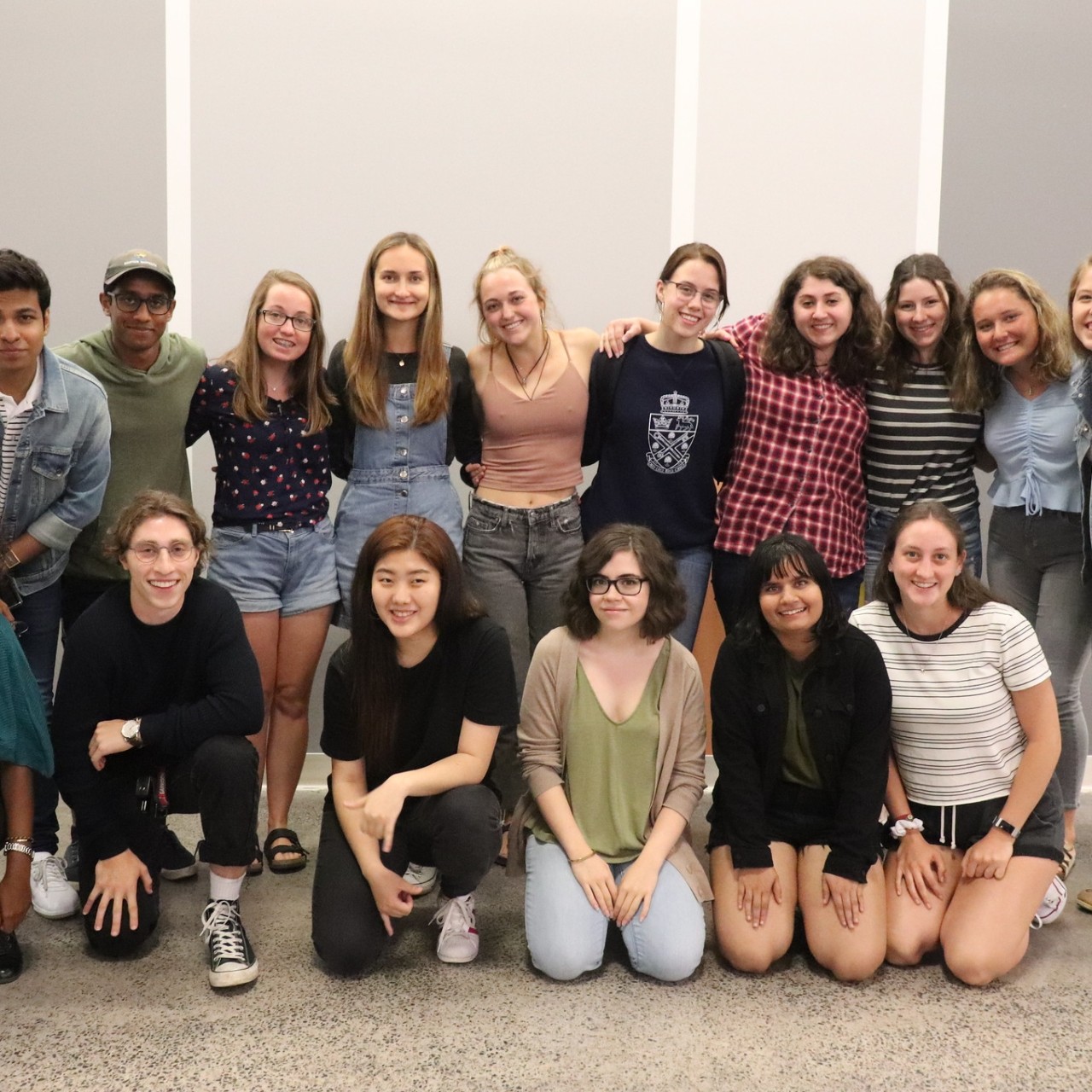This article was updated in August, 2023.
The transition from high school to university is a big one, an important one, and sometimes even a scary one. You’re spreading your wings, finding some new independence, and discovering new abilities and talents. And that will become apparent when you first step foot into a Dal classroom or lecture hall. It’s going to be different from what you’re used to, so here's the lowdown.
1. Your classmates are from everywhere
You may take some classes with people from your hometown—possibly even your own neighbourhood or high school. But the vast majority of people you meet at Dal are going to be from other places in Canada and from over 115 countries around the world! Expand your horizons and make an effort to meet as many people as possible from outside your own 'hood.
2. You’re not in school from 8:30am—3pm every day
Unless you're in a professional program with little flexibility, you can generally pick your own class schedule. If you don’t want to start your day until noon, you don’t have to (well, you might have to, depending on class availability…). If you want to take night classes instead of day classes, go for it. If you want a five-hour study break, do it. The flexibility is great, but you need to be careful and realistic when you’re planning. Make sure you’re still taking the classes you need to get your degree. And if you're ever unsure which classes you need to take, there are advisors you can talk to.
3. You get a 4-month summer
Score! Then comes the decision with what to do with your summer. Hint: you'll probably want to earn some money to pay for your 2nd year—and have some fun, of course! You can also take some summer courses to give yourself a break during the school year.
4. You’ll be switching buildings, not only classrooms
Dal’s campuses are likely a lot bigger than your high school. Our different faculties are typically each housed in their own buildings, meaning most of your arts class will be in one building (the McCain Building), your science class in another (the Life Sciences Centre), and your business class in another (the Rowe Building). You’ll learn in the first few weeks how long it takes to get between buildings and all the tips, tricks, and secret tunnels (yes, Dal has some underground tunnels in Halifax that will come in handy during the winter). Check the campus maps on dal.ca or in the Dal Mobile app to help you get from A to B.
5. Attendance isn’t always taken
Unlike in high school, your professors aren’t typically going to be taking attendance and tracking you down if you miss a class or an assignment. This is especially true for asynchronous courses! Classes and class work are completely your responsibility, including showing up for labs, tutorials, and clinical placements. It’s a big responsibility — don’t take it lightly or you’re going to be scrambling to get caught up and keep your head above water. And if you miss a class, it’s up to you to find a classmate to share their notes. That’s not your instructor’s job.
6. You know all of your readings and assignments on the first day of class
In each of your classes, your instructor will provide you with a syllabus on the first day. This is your guide, map, and golden ticket for the semester because it includes contact information, assigned readings, assignment outlines, and midterm dates. It helps you plan ahead because you’ll know your busiest weeks from the start. Depending on how your professors organize their courses on Brightspace, you might be able to access all of your readings and assignments right away. It’s up to you if you want to work ahead, but just make sure that you’re not losing track of when your work is actually due.
Pro tip: Set reminders in your phone or computer a week or two before each of your major assignments is due so you don’t get caught up in readings or extracurricular activities and stuck trying to finish it the night before it’s due.
7. There's always an event to attend or something to do
Between society events, faculty events, performances at the Fountain School of the Performing Arts in Halifax, DSU events in Halifax, DASA events in Truro, varsity Tigers games in Halifax, varsity Rams games in Truro, open lectures, and hanging with your friends, you will never have a shortage of things to do on campus. The online events calendar is the best way to make sure you’re up to speed.
8. You’ll spend more time studying than in class
As the saying goes, for every hour you have in the classroom you’ll spend two or three studying at home. It’s true! First-year Dalhousie students report spending an average of 17.3 hours a week preparing for class, according to the 2017 National Survey of Student Engagement. If you do your readings early, class time will ensure you understand the material and your profs will give you their real-life examples. If you do your readings after class, they’ll provide those “ah-ha!” moments where everything makes sense. Your classes will add value to your readings and vice versa, so make sure you do both.
Pro tip: When reading your textbook, don’t skip over the sidebars and fact boxes. These debates, questions, and short stories are likely to appear somewhere throughout the term whether it be a question asked in class or on a midterm.
9. You could have more than one assignment or midterm on the same day
In high school your teachers most likely worked closely together to ensure that all of your assignments and tests were spread out throughout the year. Also, if you found out there were 2 or 3 tests on the same day, your teacher probably rearranged their dates to avoid conflicts. In university, your professor creates their syllabus and the dates are set. You could very likely have multiple assignments on the same day or midterms on the same day. Make sure you're aware of these busy times and plan your study time accordingly!
Pro tip: If you have three final exams scheduled on the same day at the end of the semester, you can request an alternate date for one of your exams.
10. Each assignment, midterm, and final exam is worth more
The university academic year is at least two months shorter than the high school academic year, with two study breaks (November and February) and a longer break at the end of December — score! But this means that each assignment, midterm, and final exam you write will be worth more. It’s not uncommon for an assignment to be worth 10–30% of your final mark and for your final exam to be worth up to 50%. Knowing this, make sure you give yourself enough studying time to get the grade you want. Extra credit assignments are also very, very rare.
11. Getting an A means applying what you've learned to new concepts not seen in class
In high school, getting an A usually means you were able to match all of the definitions properly and solve similar questions to what you worked on in class. In university, getting an A means you've gone above and beyond what you've learned in the classroom and applied the concepts to new situations and problems that the class may not have gone over. This doesn't mean that an A is impossible, but you definitely have to work extra hard for it.
12. There are fitness facilities on campus that you're encouraged to use
Instead of a scheduled gym class or required gym credit, university campuses have fitness facilities that you can use whenever you want (during their regular hours, of course). If you're a full-time student you've already paid your membership fee, so check them out! Being physically active will help other parts of your university experience than just your overall health—like your academics and social life. In Halifax there's Dalplex and Sexton Gym, and in Truro there's the Langille Athletic Centre.
13. At the end of your first term, you’ll have a GPA (and no report card)
At the end of each term, you’ll have a Grade Point Average. It ranges from 4.3 (A+, 90-100%) to 0.00 (F, 0-49%) and is calculated based on your class grades, which can be in percentages or letters. The Grade Scale and Definitions page is a great one to bookmark until you know them all by heart. And you can use the handy GPA calculator to figure out how you’re doing.
14. Instructors have office hours
Because of the very diverse schedules that everyone has in university, your profs will set office hours. These are typically two one-hour time periods throughout the week where you can drop in to ask questions about the course. Take advantage of these times! I’d even put them in your calendar along with your class schedule. For online courses, your professors may offer them as scheduled virtual meetings or discussion board chats.
Pro tip: If a professor's office hours conflict with your other classes, just send them an email and ask if there's another time that would work for them. They’re often happy to accommodate if you show commitment and initiative—and ask politely.
15. You can travel while you're here
If you were lucky, your high school might have arranged a week-long trip to Europe for the upper grades. At Dal, you can go away for an entire semester even a full academic year! Check with the exchange advisor at the International Centre about all the exchange and study abroad options around the world. Depending on what you're studying, there may be some program-specific opportunities in your department or faculty.
16. Academic support doesn’t always come from your teacher
If you had any problems in high school, you could always ask your teacher for help. In university, that help often comes from university services. For studying tips and tricks, you can meet with a study skills coach or take in a workshop in Halifax or in Truro. Learn to properly use the library. To improve your writing skills, make an appointment at the Writing Centre in Halifax or in Truro.
17. You'll be paying a lot for your education
Unless you went to private school, the thought of paying to go to school from primary to grade 12 seems pretty ridiculous. University costs money—a lot of money. You can figure out approximately how much it's going to cost by using the fee calculator and checking out the tuition fee schedule on Dal's Money Matters site. There's even a budget calculator to work out all your yearly expenses. And make sure to look into all your options for additional financial support.
18. Your part-time job can be at school
To help pay your way, getting a part-time job on campus is always a good idea. You can search the listings on MyCareer and get help with your resume in Halifax or in Truro.
19. Your March Break is in February (and November)
You get two! Be mindful of all of the assignment deadlines and midterms the week after study break. Guaranteed your professors will tell you that it's called Study Break for a reason!
20. The student union is a pretty big deal
Your school student council may have been the group behind organizing the prom and other school events, but the Dalhousie Student Union (DSU) has a much bigger job. Yes, it organizes lots of events, but it's also responsible for things like the student health plan, Student Advocacy Service, sexualized violence survivor support, Orientation Week, student societies, and a lot more.
In Truro, the Dalhousie Agricultural Students Association (DASA) is the DSU's eyes and ears on the Agricultural Campus and organizes events specific to Aggies.

